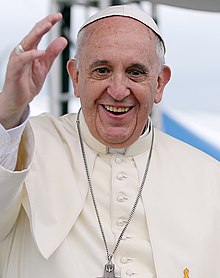Francis (given name)

|
|
| Pronunciation | /ˈfrɑːnsᵻs, ˈfræn-/ |
|---|---|
| Gender | Male (primarily) |
| Name day | October 4 |
| Word/name | Latin |
| Meaning | Free man |
| Related names | Franciscus, Francisco, François, Franciszek, Francesco, Francesc, Ferenc, Frank, Franco, Franz, Frans, Franklin |
Francis is a French and English given name of Latin origin.
Francis is a name that has many derivatives in most European languages. The female version of the name in English is , and (less commonly) Francine. (For most speakers, Francis and Frances are homophones or near homophones; a popular mnemonic for the spelling is "i for him and e for her".) The name Frank is a common diminutive for Francis and Fanny for Frances.
Francesco ("the Frenchman") was the name given to Saint Francis of Assisi (baptized Giovanni) by his francophile father, celebrating his trade with French merchants. Due to the renown of the saint, this Italian name became widespread in Western Europe during the Middle Ages in different versions (Francisco, François, etc.). However, it was not regularly used in Britain until the 16th century as Francis.
The name of France itself comes from the Germanic people known as the Franks; the origin of their name is unclear but is thought to mean "free".
The characteristic national weapon of the Franks was the francisca, a throwing axe.
Related names are common in other Western European languages, in countries that are (or were before the Reformation) Catholic. Other non-European languages have also adopted variants of the name. These names include:
...
Wikipedia
